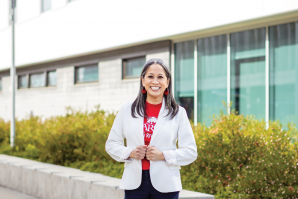As his company went public, Dinakar Munagala was halfway around the world, nearly 6,000 miles from his team, at a ski resort.
But this wasn’t a celebratory vacation.
On January 14, 2025, Blaize, an AI chip startup in El Dorado Hills, merged with BurTech Acquisition and began trading on Nasdaq, achieving a $1.2 billion valuation. Munagala, co-founder and CEO of Blaize, was in Davos, Switzerland, for the 2025 World Economic Forum Annual Meeting, where he explained how the IPO would boost publicity, access to talent and customer trust.
Seven weeks later, Munagala recalls the moment as “surreal.” But in the end, it was just that — a moment. From there, the team adjusted to stricter public trading reports while staying focused on commercialization, investor value and product development.
An IPO is a major milestone for any entrepreneur, and this achievement is a long way from where Blaize began in 2010: a cluttered bedroom in El Dorado Hills with five former Intel engineers drawing on whiteboards.
“When we started, of course, we’re thinking, ‘Let’s make this big one day,’ but we never knew exactly what that would mean,” Munagala says. “Would it be a large, private company with an exit? Would it be an IPO? We didn’t know.”
The 2010s feel like a lifetime ago. But in the startup world, a decade can pass in the blink of an eye as founders raise funds, build products and try to attract customers. It’s a wild ride that not everyone has the access, resources, means or the mentality to stomach. Most fall short. But since 2015, some startups in the Capital Region have defied the odds, reaching remarkable heights.
From big paydays to sustainable growth, success can take many forms. Some companies, such as Blaize and Origin Materials in West Sacramento, achieve IPOs. Others secure massive exits, like Folsom-based education software company PowerSchool, which Bain Capital acquired last year in a $5.6 billion deal. But in nearly every case, success isn’t an overnight switch. It’s a long-haul journey.
Just ask Bill Gates. Even a decade after Microsoft went public in 1986 (and he became the world’s youngest self-made billionaire at 31), he feared he might lose it all.
“Not until the late-’90s did I feel like, ‘Wow, we can even make
a few mistakes and still be okay,’” Gates told CNBC. “I thought I
was one mistake away from death until then. That was just my
mentality.”
Local entrepreneurs talk about their story, success and lessons
learned.
EDRIS BEMANIAN, CEO
Engage3, big data and AI startup
What does success mean to you?
“Success used to be about chasing the next milestone — landing a big customer, closing a funding round, launching a key product feature. But over time, I learned that true success is more about consistent progress than flashy, monetary wins. These days, I define success as being at least 1 percent better as a company today than we were yesterday. That daily improvement compounds over time, driving growth, attracting talent, deepening customer relationships and ultimately leading to fulfillment.”
How many times did you think about quitting?
“I don’t think about quitting because every week at Engage3, I’m learning and pushing my limits. … Of course, there were tough moments, especially over the last two years, when I questioned whether I was the right person to lead Engage3 through its next phase. … As long as I’m learning, surrounded by a strong team and seeing that 1 percent improvement every day, quitting doesn’t even cross my mind.”
What’s the most unexpected thing that helped your startup reach this level?
“Having investors who initially passed on us come back to lead later funding rounds. It happened in our Series B, C and D — each time, they had turned us down before. It was a powerful reminder to never burn bridges and to keep focusing on execution and growth. … Staying persistent, showing progress and maintaining relationships turned what felt like setbacks into pivotal growth moments.”
Proof is in the progress
As Lokesh Sikaria, managing partner at Moneta Ventures, points out, leadership makes a big difference in a company’s resilience. Strong leaders steer the ship with a compelling vision. They rally their teams and attract support, adjusting strategies as needed with informed action.
Sikaria highlights Greg Connolly, co-founder and CEO of Trifecta, as one of the best in the industry when it comes to marketing and positioning his product. The startup has become the nation’s largest organic meal delivery service with almost $100 million in annual revenue. Sikaria also mentions Edris Bemanian, CEO of big data and AI startup Engage3, who took a company in trouble and turned it around.
That said, Sikaria cautions leaders not to waste time trying to sway uninterested investors. Moneta, for example, supports only 3 percent of the companies they hear from (meaning 97 out of 100 founders get a no). Instead, Sikaria advises, founders should focus on finding the believers and prove themselves through progress rather than persuasion.
Interestingly, Trifecta and Engage3 are two companies Moneta initially passed on. Trifecta is outside of its focus area, though Sikaria acknowledges it was “a miss from an investor standpoint.” As for Engage3, the company wasn’t ready, but a year and a half later, after delivering on its promises, the startup earned Moneta’s support.
“If you said you will do certain things in 12 months, and then you’re able to show them (investors) that you were able to do that,” Sikaria says, “you certainly can convert them.”
In addition to time, Sikaria also advises leaders to prioritize place when it comes to finding support. Specifically, startups should seek investment from their local regions, and he gives three key reasons why.
1) Local connections make hiring easier as a company grows. For example, if you’re based in Sacramento, local investors can help you fill critical positions more easily than a venture capitalist in Denver.
2) Regional high-net-worth individuals will more likely invest in startups they recognize, increasing visibility and funding opportunities.
3) Local VCs often have the backing of regional businesses, which makes it easier to secure early customers.
According to Sikaria, this ecosystem support can be crucial in closing funding rounds and gaining early traction in the market.
BRANDON BROWN, CO-FOUNDER AND BOARD CHAIRMAN
Grin, content creator management platform
Brandon Brown is the co-founder of Grin, a content creator
management platform. He says the people around him and
relationships are the key to being successful. (Photos by Fred
Greaves)

What does success mean to you?
“Success, to me, is freedom — freedom over my time, freedom to create, to take big swings, to bet on myself and the people around me. It’s about building something that lasts while staying true to who I am and enjoying the journey.”
How many times did you think about quitting?
“More times than I can count. The pressure, the setbacks and the moments where everything felt like it was on the line have been and continue to be constant. But every time things get tough, it is clear that the people around me make the difference. When you have a team that believes in the mission, takes ownership and plays to their strengths, you can push through just about anything.”
What’s the most unexpected thing that helped your startup reach this level?
“The power of relationships. The biggest unlocks came from the right people at the right time, whether it was customers, investors, mentors or team members who went all in with me. Relationships have been the ultimate multiplier.”
Relationship game
Successful leaders also know how to adjust their perspectives. They listen to customer signals and know when to pivot instead of doubling down, says John Peters, chairman and president of Sacramento Angels, a local VC group that has invested in more than 100 companies since its founding in 2000.
Many founders get too attached to their original idea. But the best ones stay hyperaware of how their product fits in the market, he says, highlighting Grin as a successful company the Sacramento Angels invested in.
Of course, leaders don’t reach their goals alone. From employees to investors, a successful startup needs the right people involved to thrive.
“Invest the time and energy to hire great people who bring the skills you need but also align with the culture you’re building,” Peters says.
“Move on quickly from those who don’t fit.”
Just like the wrong team can slow progress and create friction, the wrong investors might not provide strategic guidance or valuable networks. Thinking long-term, founders should seek out the right people and partners who understand the vision and can actively support it.
Over the past decade, the region has evolved to offer more opportunities for founders to gain a foothold where access was once limited. Programs like FourthWave, an accelerator launched in 2017 to nurture and scale women-led tech businesses, played a vital role in this shift.
To date, more than 70 founders have successfully completed the program, according to Cheryl Beninga, co-founder of FourthWave. She highlights companies such as Elve, a manufacturer of high-powered amplifiers designed to boost connectivity, and Foodom, an online marketplace where customers can find personal chefs, among others.
Also, Sacramento now has the Minerva Fund, a dedicated investment vehicle focused on supporting women entrepreneurs.
“However,” she adds, “ensuring sufficient seed capital and providing robust mentorship for the development of early-stage startups is a challenge.”
In response, FourthWave is partnering with the Carlsen Center for Innovation and Entrepreneurship to “help bridge the gap between early innovation and scalable success,” Beninga says.
CHRIS JOHNSON, CEO AND FOUNDER
The Johnson Group, architectural and engineering talent acquisition firm
Chris Johnson, CEO and founder of The Johnson Group, a national
architectural and engineering talent acquisition group, says
entrepreneurial success has given him more freedom. But he says
he also learned from adversity. “The greatest challenges provided
the greatest learnings.”

What does success mean to you?
“Success is freedom. Freedom of time, freedom of money, freedom of purpose. The ability to go where you want, with whom you want, when you want and bless whom you want, is success.”
How many times did you think about quitting?
“Never. Quitting was never an option. Suffering is the prerequisite to any great achievement. I suffered a lot, tears flowed from my eyes, however, I never lost faith. I truly believed that God would provide, and that He wouldn’t put more on me than I could bear. He never broke a promise.”
What’s the most unexpected thing that helped your startup reach this level?
“That adversity, as painful as it is, is truly a blessing unrevealed. You get the test first and the lesson later. The greatest challenges provided the greatest learnings, and have led to success that was beyond my imagination.”
Blazing the trail
Ten years ago, Munagala and his co-founders saw that AI-driven algorithms would shape the future. Turning that vision into reality took time, trial and error, and the ability to push past obstacles that seemed impossible.
For Blaize, the rapid expansion of AI five years ago was a turning point, helping validate the company’s value. Capital wasn’t always easy to secure. The team faced missed deadlines and financial uncertainty, but they kept going because persistence is what success demands.
“Every startup has to die three times before it survives,” Munagala says. “We’ve had our near-death situations where we thought it was all over, but then we somehow managed to pull through.”
Get all the stories in our annual salute to women in leadership delivered to your inbox: Subscribe to the Comstock’s newsletter today.
Recommended For You

The Gray Wolf Was Once Thought to Be Extinct in California. Instead, It Has Made a Remarkable Comeback
Since OR-7, nicknamed Journey, made his fateful crossing, the California wolf population has grown to more than 70 since 2011. However, they remain listed under both the state and federal Endangered Species Act.

Dilemma of the Month: How Do I Start a New HR Department?
A small electrical contractor that had never had an HR department
before hired me as their first HR manager. I’m trying to figure
out how to approach this, and I have questions.

Excitement in Sacramento as the A’s Take the Field at Sutter Health Park
When the team formerly known as the Oakland Athletics took on the Chicago Cubs March 31 at West Sacramento’s refurbished Sutter Health Park, it became official: Sacramento, at least temporarily, has hit the big leagues.

Business Book Review: ‘How to Live an Analog Life in a Digital World’
In an age of relentless digital distraction, Fair Oaks resident Frank Possemato offers a refreshingly analog antidote. Possemato’s self-published workbook, “How to Live an Analog Life in a Digital World,” delivers sage advice with a simple message.

The Way We Work: Lisa Cardoza
A glimpse into the daily life of the president of American River College
Helping students is in Cardoza’s bones. She calls her philosophy “Students first,” and this informs everything she does at ARC, which serves over 30,000 students, making it the sixth largest public two-year college in the nation.




